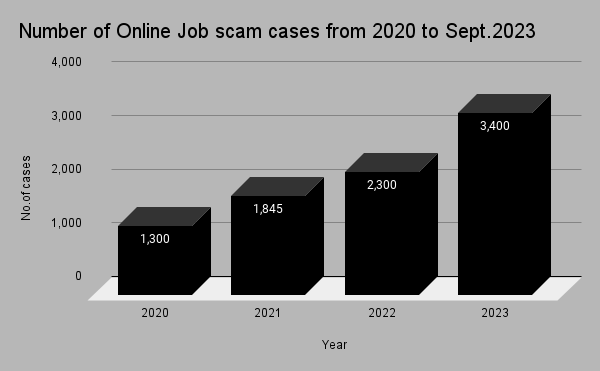According to cyber crime records, a total of 3,400 online job scam cases have been reported as of September 2023 due to lack of awareness among people. In 2022, there were 2,300 online job scam cases.
Bengaluru: According to data from Cyber Crime Records Bureau (CCRB), online job scams in Bengaluru are on the rise, causing privacy concerns among internet users. On Thursday, three additional individuals reported to the city’s cyber crime police. N. Satheesh Kumar, Joint Commissioner of Police said that cybercriminals tricked these three people with fraudulent part-time online job offers, resulting in financial losses. “The police are actively trying to catch the culprits,” the officer said.
Tejaswini Srinivas, Cyber Security Analyst at Commissioner of Police, said that there has been an increase in cases compared to the previous year. A total of 3,400 online job scam cases were reported from Jan. to Sept. 2023. In 2022, there were 2,300 such cases, resulting in huge financial losses. However, efforts are being made to recover the lost money from as many cases as possible, said the security analyst.

Swati Barik, a student at Dayanand Sagar University in Bengaluru said, “I was a victim of cyber fraud. The scammer appeared very professional. I had been applying for jobs and hadn’t received a confirmation letter. One day, I received an e-mail saying I was selected, and it asked me to click a link and provide personal and financial information. The scammer said they saw my LinkedIn profile and offered me an opportunity at Deloitte with a salary of around Rs. 6 lakhs per annum (LPA). Believing it was a real job offer, I shared all my personal details.”
She said that after the initial call, she didn’t hear from them again. She also found out that Rs.10,000 was taken from her account after the scammer asked for the registration One Time Password (OTP) during the call.
Avinash, another victim of an online job scam, said that he came across a well-known company offering work-from-home jobs. The scammers had set up a fake website that looked very similar to the real company’s website, but he didn’t inspect it closely. He didn’t realize it was a scam and went ahead, thinking it was legitimate. He met all the requirements they asked for and provided his personal information.
Later, they asked him for the OTP, and he ended up losing Rs. 40,000. Dikshant reported the incident to the cybercrime police, who informed him that it would take about 10 days to identify the culprit. “I’m still waiting for my money to be recovered,” said Dikhsant.
Srutha Reddy from Hebbal said that she was offered a job by someone who said they were from Amazon. They said her job was to increase the number of transactions done by sellers on the Amazon website. To make her trust them, they asked her to log in to a fake Amazon
website. After she did this, they put a large amount of money in her account. They also promised to put even more money in her account in seven days to gain her trust. Later, they asked her for Rs.10,000 to continue the job. However, once she sent the money, the people who offered her the job never contacted her, added Srutha.
Satheesh Kumar said that the police are making best efforts to recover the money, and they have successfully recovered Rs.70 lakh this year. He also said that despite numerous awareness campaigns about cybercrime, many people, including educated individuals, continue to fall victim to it. The police are taking action against the scammers and are hopeful that the number of cases will decrease.
Bhaskar Chowdhary, an expert in cybercrime and open-source intelligence at The Centre for Advanced Research in Digital Forensics and Cyber Security, Bengaluru, mentioned the numerous ways in which scammers can pose a threat. He said, “They can harm you by employing hacking techniques, using malicious software to enter your computer and phone to steal personal information. When your devices have weak security, it becomes easier for them to access your personal data. Furthermore, scammers utilize automated calling and spoofed area codes to manipulate you into answering the phone and then request your personal information. This problem is on the rise because people still lack awareness about these scams.”

Rangaswamy Naik, a Superintendent of Police (SP) said, “The rise in online job scam cases is due to several factors, one reason is there are individuals who are in an urgent need of money, which makes them believe in fake job offers. Additionally, many victims of these scams are newcomers to the job hunting process, who lack the experience to recognize such fraud schemes. In some cases scammers often manipulate personal relationships to reach their targets.”
Additionally, the officer said that there is hope, as cybercrime officers are trying to recover the money that people lost by falling victim to these scams.




